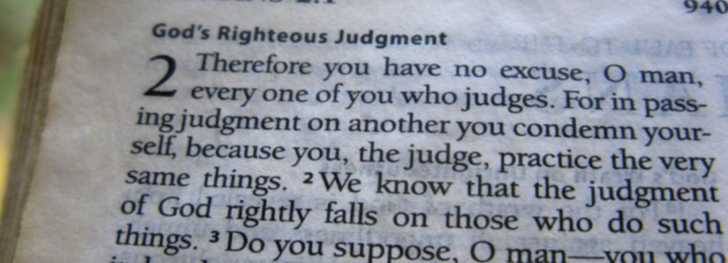
“You, therefore, have no excuse, you who pass judgment on someone else, for at whatever point you judge another, you are condemning yourself, because you who pass judgment do the same things” (Romans 2:1). Everytime I read this, it knocks me back off my feet. It is like suddenly seeing oneself in a mirror for the first time and not liking what you see.
Are we not all guilty of this? Do we not judge others all the time? And when we do, are we not placing ourselves above those we judge? God’s truth is shockingly clear here; when we do this, we are condemning ourselves, for we are often guilty of the same things that we condemn others for and do not realize it. Paul is holding this mirror up to the Roman Jews because they were becoming judgmental of their pagan neighbors. They were turning the great gift of their faith into an instrument of inordinate pride.
Paul is pointing out the very important matter of “humility” to the Jewish Christians in Rome who had been judging and condemning the Gentiles and Gentile converts. He is showing them that, in spite of the special revelation given to them, the Jewish Christians enjoy no advantage in moral status before God. For the truth is that the whole human race is guilty before God. The Final Judgment on the Last Day will not be based on our humanly perceived privileged status, but on how we lived our lives. From the perspective of God, all human beings stand on equal ground. God’s judgment against those who pass judgment on others, whether Christian or not, is based on truth. “So when you, a mere human being, pass judgement on them (the Gentiles) and yet do the same things, do you think you will escape God’s judgment?” (verse 3). It is not our place as human beings to judge the status of anyone’s soul before God. We do not have the competence to do so, because we are sinners ourselves. On the contrary, our job is to be compassionate, understanding, and, most importantly, forgiving. Our job, as Christians, is to live our lives in the manner Jesus modeled to us. We can challenge others, only if we are also challenging ourselves. We can even preach the Good News to others, but only if we are practicing what we preach. But even more importantly than that, we are to pray for one another, always and everywhere.
Jesus gave us the perfect prayer to help us do this: The Lord’s Prayer. Do we not pray there, “forgive us our trespasses, as we forgive those who trespass against us?” In that one line, the truth that we all must face, is revealed; we are all sinners, “forgive us our trespasses.” That is why we are to learn and to practice the virtue of “[forgiving] those who trespass against us.” That is why we are not to be found guilty of judging others. We do not bring others to Christ by judging and condemning them. We bring them to Christ by our example, by our living in the manner that he taught us with his own life. One who judges in the ways that Paul is talking about here in his Letter to the Romans, is guilty of placing him or herself above the other with a false pride. This can never be the goal, or the purpose of love. It is only when one sees the truth, that he or she is a sinner before God, yet still loved by him, that he or she can be moved with true compassion for his or her fellow sinners. When we are able to see ourselves and all of our brothers and sisters as equally in need of God’s forgiveness, then, we too will begin to be able to love one another with true love, understanding, compassion, care, and forgiveness.
Lord, Let us not be found guilty of judging others, “showing contempt for the riches of [your] kindness, forbearance and patience, not realizing that [your] kindness is intended to lead us to repentance” (verse 4). Give us the spiritual wisdom to avoid judging others out of prideful ignorance of our own failings. Help us to understand more clearly that we will be forgiven only to the degree that we have learned to forgive. We ask these things in your name, Jesus. Amen!
Want more daily devotionals, inspirational verses, and Bible reading plans? Just choose a plan and sign up for a free eBible account. It’s that simple! CLICK HERE!
SKM: below-content placeholderWhizzco for FHB

